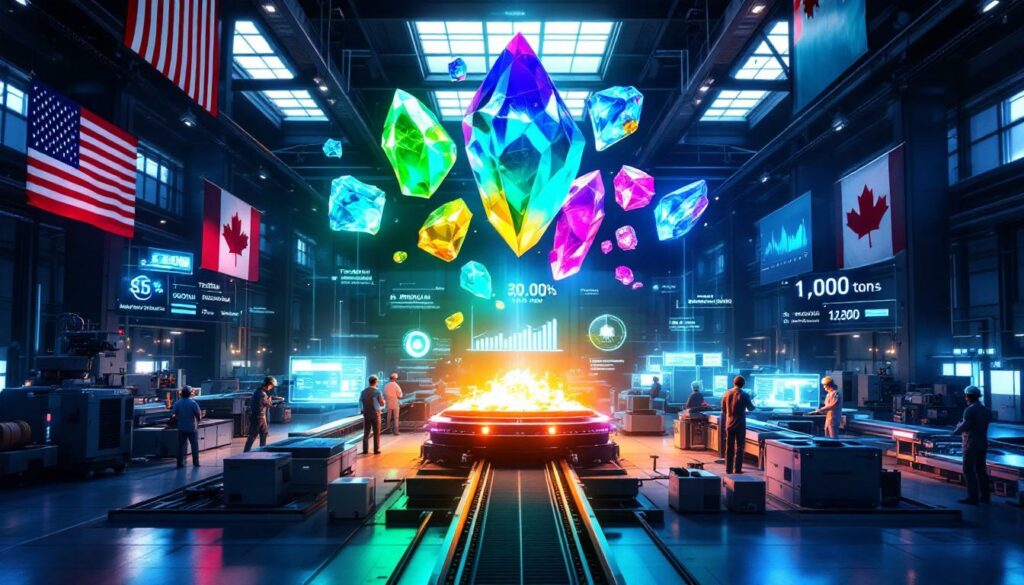What is Ucore's Louisiana Rare Earth Project?
Ucore Rare Metals Inc. is developing an $80 million rare earth processing facility in Louisiana that represents a significant step toward reducing US dependence on Chinese rare earth processing. Located in an 80,000-square-foot building on a former Air Force base at England Airpark in Alexandria, this strategic facility began construction in June 2025 with substantial Pentagon backing, with production scheduled to begin in May 2026.
The facility's placement within a designated foreign trade zone provides crucial advantages for international supply chain integration. As Ucore CEO Pat Ryan explains, "You can bring inputs from Brazil, process the material and send it back to Japan for magnet making with no tariff consequences coming in or going out." This enables duty-free movement of materials between countries for processing and manufacturing, creating a seamless global supply network.
Strategic Importance for North American Supply Chain
The Louisiana facility is designed to process and refine rare earth elements crucial for defense applications, electric vehicles, and consumer electronics. Its strategic location and foreign trade zone status make it a pivotal node in rebuilding North America's critical mineral independence.
By establishing domestic processing capabilities, Ucore is addressing a critical vulnerability in U.S. supply chains. The facility will transform imported raw materials from trusted allies like Australia and Brazil into high-value refined products ready for manufacturers across North America and partner nations.
The project represents a cornerstone in the broader U.S. strategy to secure domestic rare earth element supply chains, with potential to fundamentally alter the landscape of critical minerals order processing in North America.
How Will Ucore's Production Scale Over Time?
Ucore has established an ambitious but methodical scaling plan for its Louisiana facility. Production will begin in May 2026 with an initial target of 3,000 tons of rare earth elements annually. According to company projections, capacity will expand dramatically to reach 12,000 tons by 2027 upon completion of all four planned construction phases.
"The company aims to produce as much as 3,000 tons of rare earths next year and reach 12,000 tons by 2027 when the entire plant is finished," states Pat Ryan, Ucore's CEO. This 300% capacity increase within a year demonstrates the company's confidence in both market demand and its processing technology.
The Pentagon has provided $18.4 million in funding specifically for the first phase of construction, highlighting the national security implications of the project. This financial support underpins the initial buildout while Ucore secures additional investment for subsequent phases.
Materials and Processing Focus
The Louisiana facility will focus on heavy rare earth magnet materials including terbium, neodymium, samarium, and praseodymium – elements critical for high-performance permanent magnets used in defense systems and electric vehicles.
Meanwhile, Ucore already operates a demonstration plant in Kingston, Ontario with 110-ton annual capacity. This facility, described as the size of two tennis courts and fully computerized, serves both as a technology proof-of-concept and a specialized production center focusing on cerium and gadolinium.
This two-facility approach allows Ucore to optimize processing based on raw material characteristics and end-product specifications. The Kingston facility handles light rare earth elements while Louisiana concentrates on the heavier, more valuable elements required for magnet production.
Why Are Rare Earth Processing Facilities Critical for the US?
Rare earth elements form the backbone of modern military technology, with applications ranging from precision-guided weapons systems to advanced radar and communications equipment. These critical minerals are essential components in virtually all high-tech defense platforms, making domestic processing capability a matter of national security.
The global rare earth market has been dominated by China for decades, creating a strategic vulnerability for U.S. defense and technology sectors. Recent Chinese export restrictions on certain rare earth metals have heightened the urgency for developing alternative supply chains, with Beijing leveraging its near-monopoly position as a geopolitical tool.
The Trump administration has been pushing aggressively for increased domestic production order, recognizing that reliance on a strategic competitor for these materials represents an unacceptable risk. Pentagon funding for projects like Ucore's Louisiana facility demonstrates the government's commitment to addressing this vulnerability.
Applications and End Markets
Beyond defense applications, rare earth elements are fundamental to numerous civilian technologies:
- Electric vehicle motors require neodymium and praseodymium for high-performance permanent magnets
- Consumer electronics depend on various rare earths for components like speakers, vibration motors, and display technologies
- Wastewater treatment facilities utilize cerium-based compounds as filtration catalysts
- Industrial motors and generators rely on rare earth magnets for efficiency and performance
Defense contractors represent key potential customers for Ucore's output, but the company is strategically positioning itself to supply multiple sectors. This diversified customer base helps ensure stable demand while contributing to supply chain resilience across critical industries.
The establishment of domestic processing capacity addresses the most significant bottleneck in rare earth supply chains. While mining operations exist in various locations globally, refining capabilities remain concentrated primarily in China. By focusing on this critical processing step, Ucore is targeting the most strategically valuable segment of the supply chain.
Who Is Behind Ucore Rare Metals?
Founded in 2006 and headquartered in Halifax, Nova Scotia, Ucore Rare Metals has transformed from a traditional mining company into a processing technology leader under the direction of CEO Pat Ryan. The company is publicly traded on both Canadian and US exchanges, with a market value of approximately $100 million as of July 2025.
Ucore's stock performance has been remarkable, more than doubling in value during 2025 alone. The announcement of the Louisiana plant triggered another 14% jump in share price, reflecting strong investor confidence in the company's strategic direction.
Strategic Vision and Business Model
The company experienced what CEO Pat Ryan describes as a "eureka moment" in 2018, pivoting from a traditional mining focus to processing technology. This shift embodied Ryan's philosophy that "if you control the refining, you'll control the resource" – recognizing that the most valuable and strategically important segment of the rare earth supply chain is processing capability, not necessarily ownership of raw materials.
"We realized that mining was just the first step. The real value – and the real strategic importance – lies in the ability to process and refine these materials into usable forms," Ryan explained when describing the company's transformation.
While Ucore owns a rare earth deposit in Alaska, the company has prioritized developing processing technologies and facilities. This approach allows Ucore to process materials from multiple sources rather than being limited to a single deposit, creating flexibility in raw material sourcing.
Looking ahead, the company is already planning a potential second processing plant in Ontario, building on the success of its Kingston demonstration facility. The business model targets diverse customer segments including defense contractors, EV manufacturers, and wastewater treatment companies, spreading risk across multiple industries.
How Does Ucore Compare to Other North American Rare Earth Processors?
The North American rare earth processing landscape remains sparsely populated, with only a handful of companies developing significant capabilities. MP Materials Corp. operates the only commercial-scale processing facility in the United States at Mountain Pass, California, focusing primarily on light rare earth elements.
In Canada, the Saskatchewan Research Council is scaling up production in Western Canada, while Energy Fuels Inc. maintains processing capacity in Utah. Within this limited competitive landscape, Ucore has positioned itself as one of the few companies pursuing comprehensive rare earth processing in North America.
Technological Differentiation
Ucore's competitive advantage stems from several key technological and strategic factors:
- Fully computerized production systems enabling precise control and optimization
- Dual-facility specialization allowing targeted processing of both light and heavy rare earth oxides
- Strategic location within a foreign trade zone providing significant logistical advantages
- Capability to process materials from multiple international sources rather than relying on a single deposit
The company's demonstration plant in Kingston, Ontario provides crucial technological validation while also serving as a production facility for specific elements. This "prove-then-scale" approach has allowed Ucore to refine its processes before committing to full-scale production in Louisiana.
Ucore's specialized expertise in producing magnet materials positions the company to target the highest-value segments of the rare earth market. While competitors like MP Materials focus primarily on light rare earths, Ucore's capability to process heavy rare earths addresses a particularly critical supply gap in North American capabilities.
What Impact Will This Facility Have on Global Rare Earth Markets?
The establishment of Ucore's Louisiana processing facility represents a significant step toward reducing North American dependence on Chinese rare earth processing. By creating an alternative supply channel for these critical materials, the facility will contribute to greater price stability and supply security for manufacturers across multiple industries.
For Japanese magnet manufacturers in particular, Ucore's facility offers a valuable alternative source of refined rare earth materials. The foreign trade zone designation enables efficient movement of materials between countries, facilitating new supply arrangements that bypass Chinese processors entirely.
Market Implications and Supply Chain Effects
The development of more resilient international supply networks represents perhaps the most significant long-term impact of Ucore's facility. By demonstrating the commercial viability of rare earth processing outside China, the project may serve as a catalyst for additional North American processing investments.
While a single facility cannot transform global market dynamics overnight, Ucore's Louisiana plant establishes an important precedent and provides proof-of-concept for financial backers considering investments in this critical sector. The involvement of Pentagon funding further validates the business model and may encourage similar public-private partnerships.
Economic and Regional Benefits
Beyond the strategic implications, Ucore's facility brings tangible economic benefits to the Alexandria, Louisiana area, including:
- Creation of high-skilled manufacturing jobs in a region transitioning from military to civilian economic activity
- Development of advanced technical capabilities within the local workforce
- Utilization of former military infrastructure for productive industrial purposes
- Potential for downstream manufacturing growth as companies seek proximity to rare earth sources
- Enhancement of U.S. critical mineral security with minimal environmental disruption compared to mining operations
The facility's location at a former Air Force base demonstrates effective repurposing of military infrastructure for civilian industrial use, providing a template for similar redevelopment projects nationwide.
What Are the Financial Aspects of Ucore's Louisiana Project?
The total project cost for Ucore's Louisiana facility is estimated at $80 million, with construction divided into four phases with staggered completion dates. The Pentagon has committed $18.4 million in funding for the first phase of construction, underscoring the national security importance of the project.
The remaining funding structure has not been fully disclosed, though the company's strong stock performance suggests investor confidence in the business model. Ucore's market capitalization of approximately $100 million as of July 2025 provides a foundation for capital raising activities to support the later phases of construction.
Investment and Funding Structure
The company's phased approach to construction allows for strategic allocation of capital resources and enables validation of technology at each stage before proceeding to the next expansion. This methodical scaling minimizes financial risk while allowing for acceleration if market conditions prove favorable.
The foreign trade zone designation provides significant tax and duty advantages that improve the financial outlook for the facility. These benefits include:
- Deferral, reduction, or elimination of certain customs duties
- Streamlined customs procedures reducing administrative costs
- Tax exemptions on re-exported materials
- Simplified compliance with international trade regulations
These financial advantages enhance the facility's competitiveness in global markets and improve return-on-investment projections for shareholders.
Business Outlook and Market Position
Ucore's stock performance indicates strong investor confidence in the company's strategic direction. The more than doubling of share price in 2025, coupled with the 14% jump following the Louisiana plant announcement, demonstrates market enthusiasm for the company's expansion plans.
The diversified customer base across multiple industries – from defense contractors to EV manufacturers and wastewater treatment companies – reduces market risk and provides multiple revenue streams. This positions Ucore to weather fluctuations in any single sector while capitalizing on growing demand across all markets for energy transition security.
The company's strategic positioning in the growing market for critical minerals, combined with its technological capabilities and government support, creates a favorable outlook for long-term financial performance. The potential for expansion beyond the initial facility, including a possible second processing plant in Ontario, provides additional growth opportunities for investors.
FAQ: Ucore's Rare Earth Processing Facility
How does rare earth processing contribute to national security?
Rare earth elements are essential components in advanced military systems, including precision-guided weapons, radar systems, and communications equipment. The Pentagon's $18.4 million investment in Ucore's facility demonstrates the defense establishment's recognition that domestic processing capacity reduces vulnerability to supply disruptions from foreign sources, particularly China.
As Chinese export restrictions on certain rare earth metals continue to threaten supply chains, developing domestic processing capabilities ensures that defense contractors maintain access to these critical materials regardless of US‑China trade tensions. This self-sufficiency in strategic materials represents a fundamental aspect of national security in the 21st century.
What are the environmental considerations for rare earth processing?
Modern rare earth processing involves chemical separation processes that require careful waste management and environmental controls. While specific details of Ucore's environmental systems aren't disclosed in available information, the company's demonstration plant in Kingston provides a template for responsible processing.
Industry best practices typically include closed-loop water systems, chemical recovery processes, and comprehensive waste management protocols. Locating processing facilities in industrial zones with existing infrastructure, as Ucore has done at England Airpark, typically minimizes environmental impacts compared to developing greenfield sites.
How does the foreign trade zone designation benefit Ucore's operations?
The foreign trade zone status allows Ucore to import materials, process them, and export finished products without paying duties on either the imports or exports. As CEO Pat Ryan explained, "You can bring inputs from Brazil, process the material and send it back to Japan for magnet making with no tariff consequences coming in or going out."
This creates significant cost advantages and flexibility in sourcing raw materials from global suppliers. The designation effectively positions the facility as an international processing hub rather than merely a domestic producer, expanding potential customer bases and supply sources beyond North American borders.
What role does the Pentagon play in supporting rare earth processing?
The Department of Defense has identified rare earth elements as strategically critical materials and provides funding to develop domestic processing capacity as part of national security strategy. The $18.4 million provided to Ucore represents this strategic investment in supply chain security.
Beyond financial support, Pentagon backing provides validation of the business model and may facilitate relationships with defense contractors who represent key potential customers for refined rare earth products. This public-private partnership approach leverages commercial expertise while addressing national security priorities.
Ready to Spot the Next Major Mineral Discovery?
Discover why major mineral discoveries can lead to significant market returns by exploring Discovery Alert's dedicated discoveries page, where proprietary Discovery IQ technology transforms complex ASX announcements into actionable investment insights. Visit https://discoveryalert.com.au/discoveries/ today to position yourself ahead of the market for your next investment opportunity.




